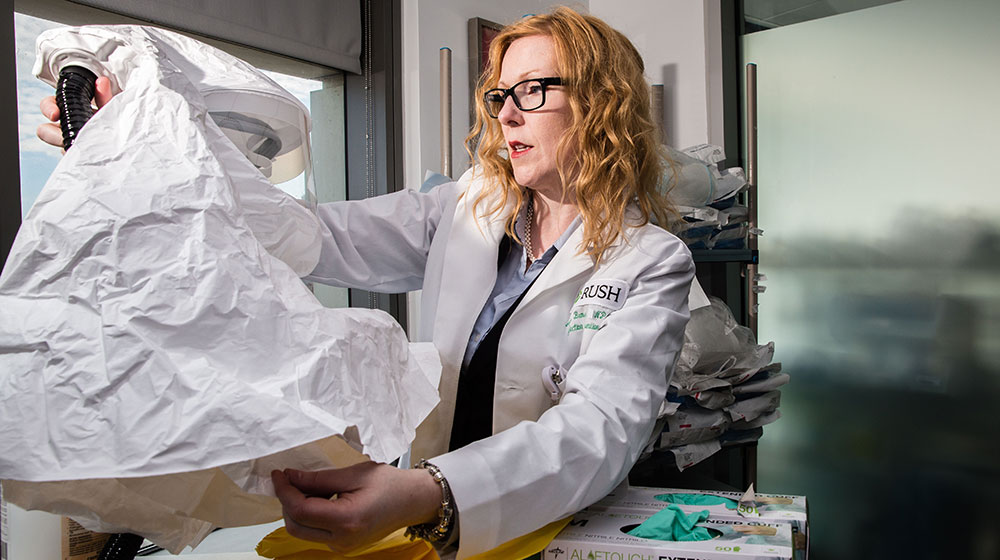archive
Preparing for the next outbreak

Niehoff School of Nursing graduate Amelia Bumsted (DNP ’15) is working to keep health care workers safe when treating infectious diseases such as Ebola. (Photo: Natalie Battaglia)
By Dirk Johnson
When the Ebola outbreak in West Africa led to the first confirmed cases of the disease in the United States in 2014, one of the questions it raised was how to best protect health care workers who were treating Ebola patients. The nursing profession has been debating the best ways to guide health care workers in such perilous situations, and Amelia Bumsted (DNP ’15) remembers thinking: “There should be an app for that.”
This story originally appeared in the fall issue of Niehoff, the magazine of the Marcella Niehoff School of Nursing. You can read more research stories on the school’s website.
Bumsted, who earned a Doctor of Nursing Practice degree—a relatively new terminal clinical degree in the nursing profession—at the Marcella Niehoff School of Nursing, has been working to develop such an app. The goal is to help clinical personnel follow CDC guidelines for donning and doffing protective equipment properly when caring for a suspected or confirmed Ebola patient. This addresses precisely the calls being made by nursing advocates, such as the American Nurses Association, which are vocal in expressing concerns about whether health care workers are safe. “They were saying, ‘We need to have proper equipment and training,’ ” Bumsted says.
Loyola’s Population-Based Infection Prevention & Environmental Safety (PIPES) DNP program, one of the first in the nation to specialize in infection prevention, focuses on populations at risk for disease. It produces graduates to become leaders and collaborators in addressing problems in health care systems, such as the ones raised when Ebola was first identified in the United States. Bumsted reviewed storyboards for videos developed by Johns Hopkins Medicine and the Centers for Disease Control and Prevention to demonstrate protocols for the use of personal protective equipment (PPE) to care for Ebola patients. A significant problem for clinicians, despite attempts to demonstrate with videos, was how to translate the CDC guidelines into practice.
Alexander Tomich (MSN ’07, DNP ’12), one of Bumsted’s mentors, was a leader in the state’s preparedness efforts to safeguard against the infection of health care workers. He is the director of Infection and Control at Rush University Medical Center, one of only 48 designated Ebola Treatment Centers in the nation. Bumsted and Tomich partnered to present a national Q&A session webinar titled “Developing an Ebola Center—What Does it Take? And What if You are Not Equipped to be an Ebola Center?”
Tomich served as a preceptor (clinical instructor) to Bumsted as she worked on her capstone project to help clinicians follow CDC guidelines for proper PPE use. The DNP program’s objective is translational research; in other words, Bumsted and other such professionals are tasked with figuring out effective ways to translate policy guidelines into actual practice at the bedside.
Honored to have the chance to work on such an important issue, Bumsted credits the culture and camaraderie of Niehoff with building professional networks and local experts in the area of infection prevention, which is what first connected her with Tomich. Expressing gratitude for the time Loyola graduates invest in mentoring students in the program, she says, “It’s the Loyola spirit for leaders to never stop learning.”

